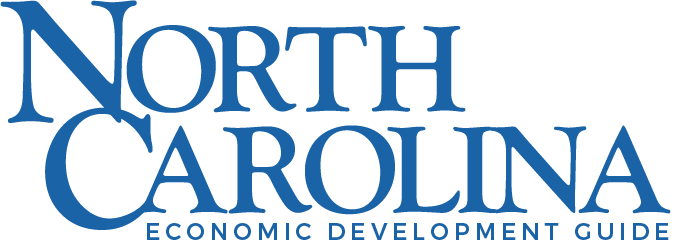Full speed ahead
Challenge: To attract advanced-manufacturing jobs to western North Carolina, a region best known as a popular vacation destination.
Solution: Tout the region’s quality of life, educational opportunities and strong sense of community to get on the radar of domestic and international manufacturers.
By Sam Boykin
Better known for its apple orchards, hiking trails and mountain views, Henderson County may seem like an unlikely place for auto-parts manufacturers to establish state-of-the-art factories. When Linamar Corp. and GF Automotive revealed in early 2016 plans to open a jointly-owned plant in the county of 111,000 people, it was yet another example of how the industry is growing in western North Carolina. Scheduled to begin production in mid-2017, the $217 million GF Linamar LLC facility will make lightweight aluminum die-casting components for automakers, creating about 350 jobs over five years. This new facility adds to Canada-based Linamar’s other locations in the state: The 50-year-old company, which had sales of $4 billion in 2015, also has a machining and assembly plant in neighboring Buncombe County and a forging plant in Wilson County, in eastern North Carolina.
Adding to the momentum is Titusville, Fla.-based Krystal Engineering LLC, which is opening a new $21 million production facility in Caldwell County and creating 82 jobs over five years with an average annual wage of more than $60,000. Krystal makes a variety of electronics components for the automotive and other industries. Company officials said they were attracted to the area due to such factors as low energy costs, a skilled workforce and training resources such as Caldwell Community College. “Perhaps the most important advantage for us has been the longstanding relationships we have with several key members of the business community here,” CEO Mark Rauchfuss said in a news release announcing the project. “The level of enthusiasm and desire that we encountered has been extraordinary — no other state is able to offer this combination of compelling attributes.”
A month after GF Linamar’s announcement, Germany-based Demmel Inc. announced plans to invest about $4.3 million in a new 90,000-square-foot production facility in Henderson County’s East Flat Rock community and build a 50-person workforce over the next five years. The company will make trim parts and decals for BMW, which makes crossover SUVs at a plant near Greenville, S.C., about 45 minutes south of Henderson County. It will be Demmel’s first U.S. facility.
“Auto-parts manufacturing is a big priority for us,” says Andrew Tate, president and CEO of the Henderson County Partnership for Economic Development. “These companies are taking note of the area’s many advantages, and we anticipate more and more will be moving here. Part of our responsibility as economic developers and stewards of North Carolina is to make sure these companies understand the inherent advantages that come with doing business here.”
Tate is quick to point out western North Carolina’s many perks for new and expanding auto-parts manufacturers, including affordable property taxes and beautiful natural scenery. Asheville, known for its breweries, acclaimed restaurants and art galleries, is in adjacent Buncombe County and about a 30-minute drive from Hendersonville, the county seat.
Tina Köhler, a spokesperson for Switzerland-based GF Automotive, says the company chose Henderson County because of its proximity to both the existing Linamar plant and its U.S. customers. “We also found a strong, skilled and dedicated workforce, and we are getting great support from the community,” Köhler says.
This support includes Blue Ridge Community College, which serves Henderson and Transylvania counties. The two-year institution works closely with area businesses to promote economic development and offers a new advanced-manufacturing program that focuses on plastics and metal molding. Köhler says GF Automotive recently arranged to provide a die-casting machine for the college to support the training of potential new employees. Other local resources include Asheville-Buncombe Technical Community College, which has a variety of workforce-development programs. The college recently opened a new advanced-manufacturing center that offers short-term training geared toward finding employment.
When GF Linamar opens its new facility on a 55-acre tract in the Ferncliff Industrial Park, Carlos Vasto will be the plant’s general manager. Vasto, who lives in Germany, has held a variety of positions for GF Automotive, including in Brazil and England. A division of Georg Fischer AG, GF uses its die-casting technology to make automotive parts at nine plants worldwide. “My family and I are very excited to relocate to North Carolina, and I am looking forward to this new challenge,” Vasto says.
• • •
While the new GF Linamar plant is a homerun for western North Carolina, Tate and others admit that recruiting these companies to the area can sometimes feel like an uphill battle. Tate explains that when an auto-parts manufacturer starts to search for a new location, it typically consults with one of its original equipment manufacturers (OEMs) to find a desirable and convenient site. North Carolina doesn’t have an OEM, so more often than not, companies interested in moving to the area will contact the 800-pound gorilla that is BMW.
“As you would expect, the state that houses the OEM will try its best to keep the project within the state,” says Tate. “So our challenge is we’re often late coming to the project, or we may not even know about it.” Tate points to a recent tax rate comparison his organization did for a company that was looking at sites in both western North Carolina and Spartanburg County, S.C., near the BMW plant. The results showed that the North Carolina industrial building property tax was about one-seventh of the cost in South Carolina and machinery property tax was about one-sixth. Moreover, another study Tate conducted for an automotive company showed that wage rates were lower in western North Carolina compared with Spartanburg County.
“We offer a lower-cost place for doing business,” he says. “But it’s not always just about who has the lowest costs. Linamar is an example of a company that had other location options — including Richland County, S.C. — and very aggressive support from other states. But they wanted to be here, where their employees would be happy long term.”
Originally from Germany, Cornel Broenner, general manager for the new Demmel plant, moved to the U.S. in 1999. He met his wife, a Henderson County native, in Charleston, S.C. After the couple married in 2007, they moved all over the country but eventually settled in Henderson County, where Broenner often rides his motorcycle along the scenic mountain roads. “We’re happy here,” he says. “We’re done moving.”
Broenner worked closely with Tate in recruiting the company. Demmel actually wanted to go to South Carolina to be close to the BMW factory,” he says. “And I admit, South Carolina had a better offer.” He says that while the county and state offered nice incentives — including a performance-based grant of up to $150,000 from the One North Carolina Fund — he eventually persuaded the company to choose Henderson County.
While Broenner may be biased, he says western North Carolina is often unjustly overlooked by companies interested in moving to the region. It’s particularly hard to compete with the Greenville/Spartanburg area along the Interstate 85 corridor, he says, because not only is the area backed by aggressive state and county incentives, it also has the BMW plant and is close to an inland port.
“The companies that are coming here from overseas and looking for a new location will draw a one-hour circle around the BMW plant,” he says. “About 80% of that circle is in South Carolina. So to pry them away from that area is really hard.”
Many visiting CEOs “don’t even make it up the mountain to see how attractive it is here for a potential workforce,” Broenner says. “People don’t realize they can actually live here, make good money and work with state-of-the-art equipment for cutting-edge companies. It’s like hitting the jackpot. … We have to do more to advertise all of our advantages, because there are so many.”
ECONOMIC DRIVER
Western North Carolina isn’t the only place in the state where auto-components manufacturing is thriving. Thanks to competitive advantages such as a favorable tax climate, business-friendly labor environment and access to an extensive rail system, North Carolina is home to more than 290 automotive-manufacturing establishments and a workforce of more than 26,000, according to the Economic Development Partnership of North Carolina. This reflects a 25% increase over the last five years.
In Shelby, about 45 miles west of Charlotte, the state’s largest city, Cleveland Yutaka Corp. has been operating for 20 years. The precision auto-parts manufacturer is a subsidiary of Japan-based Yutaka Industry Co. and operates out of a 56,788-square-foot-facility, where it has invested more than $10 million.
In addition to established companies like CYC, Shelby is also home to Germany-based KSM Castings Group, which in 2014 opened a 127,000-square-foot facility where it employs about 130 people. The company makes transmission parts. Jan-Christoph Schwarck, the president and plant manager, says KSM plans to invest about $80 million over the next six years, adding at least another 50,000 square feet and 120 new employees.
Schwarck says he decided to locate the plant in Shelby due in part to the city’s proximity to Charlotte Douglas International Airport as well as state and local incentives. The company also received a lot of support from local economic developers and Cleveland Community College. “They already had a workforce-training system in place that is comparable to German apprenticeship programs. This is a huge benefit for us.”
In addition to all the business benefits, Schwarck says he and his family love living in Shelby. “We have waterfront property on a lake, which is something we could never find in Germany. Plus, in Germany it rains about 250 days a year. Here, it’s sunny 250 days a year. And while Europeans are reserved, people here are so friendly and open. Our neighbors actually say hello to us.”

